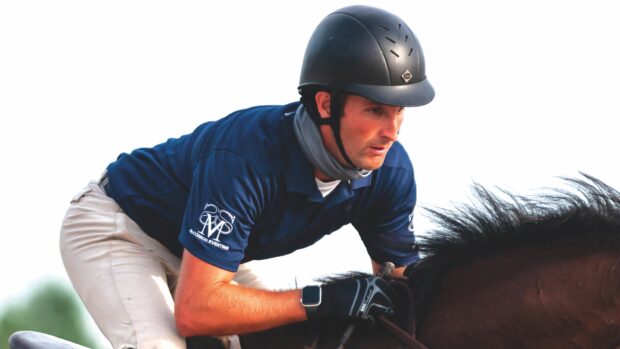“Dilemmas” around turnout, euthanasia and restrictive grazing have come under discussion by experts as they navigate what “good welfare” really means.
At the British Equine Veterinary Association (BEVA) Congress (13–16 September), animal welfare specialist Madeleine Campbell chaired a panel discussion comprising vets Imogen Burrows, Becky Smith and Isabella Wild, and animal welfare researcher Jo Hockenhull, to tackle the theme: “Good health or good welfare? Why can’t we agree what good welfare means?”
Professor Campbell opened the discussion by highlighting that in vets’ everyday working lives, they come up against “welfare dilemmas”, and one current issue is that there are numerous definitions of welfare, and debate on whether there is a difference between welfare and wellbeing.
The aim of the session was to discuss how a lack of agreement on what good welfare means can affect vets’ ability to serve the best interests of horses under their care – and vets and nurses in their daily practice.
The panellists presented case studies during which they considered the difference between health and welfare, and the moral decisions involved in each.
One was a horse with a history of laminitis, who was kept on restricted grazing with no animal companionship. From a health perspective, the horse was deemed to be doing well as he had had no recent laminitic episodes, but the question arose whether keeping him alone was good for his welfare.
“Welfare is not just that physical state,” said Dr Hockenhull, researcher at the Bristol Veterinary School. “I’d be thinking what effect is the restriction on that pony’s diet having on its mental wellbeing, and desire to perform behaviours such as foraging.
“The other concern I’d have would be relating to his social life; not only is he the only horse on that property, he can’t see or hear any other horses, which raises massive concerns for a social species kept in that level of isolation.”
Another case study opened the floor for debate on palliative care for horses, and whether it is reasonable for vets to give this when it is known that the end point is euthanasia. An example was provided of giving an owner a couple of days to come to terms with a euthanasia decision.
“Do we have responsibility towards owners as well, to enable them to have some time to come round to what’s going on, or should we be euthanising the animal there and then?,” asked Professor Campbell.
The topic of giving horses “one last summer” was raised and the ethics surrounding this.
“We see it all the time when owners say, ‘Can we have one last summer?’ So we’re providing palliative care to the arthritic horse by putting them on bute until the mud kicks in,” one attendee said. “But is that right? The horse is lame, sore, and just in the same way we’d pop a paracetamol, we’re saying it’s fine, carry on – and when the mud kicks in, we’ll put them to sleep.”
Imogen Burrows, who chairs the BEVA ethics and welfare committee, said she had dealt with a case where the owner of an ataxic horse felt pressure from others on their yard to delay euthanasia.
“Why do we have this thing of one last summer? If this issue happened in October, would we wait until the following September?,” said Dr Burrows.
“We have a job to go in and assess that horse, and we have to remember we are assessing the welfare of that horse as to whether that summer is worth it.”
A hypothetical case study looked at a high-level competition stallion given one hour of turnout per day, and the welfare concerns attached to this.
Many attendees had dealt with similar cases where owners raised concerns about the risk of competition horses’ injuring themselves in field accidents, and it was agreed that giving these owners positive examples of studs and riders that regularly turn out horses, such as Carl Hester and William Whitaker, can be beneficial.
“There’s some amazing stuff going on, but it never gets shouted about and people aren’t hearing that it can be done, and done well. These horses are still performing at a high level, but their basic needs are being met,” said Dr Hockenhull.
“It’s having that evidence and these people telling their stories, whether they are an influencer or a big name in the sport, and the more we can drip-feed from different levels and have that evidence to tell people about, the better it’s going to be.”
A recurring message was the usefulness of objective frameworks and measurement systems, such as the five domains system, and quality of life assessment tools, to help vets have difficult discussions with owners and clients.
“Having these frameworks, whether it’s the domain models, pain score models, or whatever it is, helps with engaging that conversation and not making people feel judged and they know we’re trying to optimise everything and work together,” said Dr Burrows. “To align health and welfare is a really hard juggle, but by opening the doors to the conversation it’s the best we can do.”
You might also be interested in:

‘Hearts and minds’: how changing owner behaviour can help our horses

‘No horse should have to end its life like that’: vet urges owners to stop giving away older and unrideable horses

Subscribe to Horse & Hound magazine today – and enjoy unlimited website access all year round
Horse & Hound magazine, out every Thursday, is packed with all the latest news and reports, as well as interviews, specials, nostalgia, vet and training advice. Find how you can enjoy the magazine delivered to your door every week, plus options to upgrade your subscription to access our online service that brings you breaking news and reports as well as other benefits.




